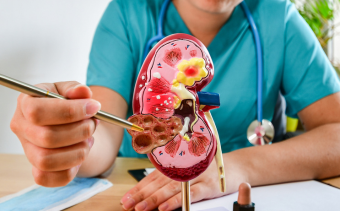Overview and Symptoms:
Focal Segmental Glomerulosclerosis (FSGS) is a rare kidney disease characterized by dysfunction in the part of the kidney that filters blood (glomeruli). Only some glomeruli are affected, but continued damage can lead to kidney failure.
Protein in the urine, which can be foamy (proteinuria)
Low levels of protein in the blood (hypoalbuminemia)
Swelling in parts of the body, most noticeable around the eyes, hands, feet, and abdomen (edema)
Weight gain due to extra fluid building up in your body
Can cause high blood pressure (hypertension) and high fat levels in the blood (high cholesterol)
Fast Facts
FSGS occurs more frequently in adults than in children and is most prevalent in adults 45 years or older.
African Americans are 5 times more likely to get FSGS in comparison with the general population
Every FSGS patient follows a unique journey.
Focal Segmental Glomerulosclerosis is one of the leading causes of End Stage Renal Disease (ESRD) in children
FSGS is associated with up to 20% of all new cases of Nephrotic Syndrome in children each year.
Treating Your Disease
Short-Term Goals
The short-term goal of treatment is to stop protein spillage completely (remission) or lower the amount of protein lost in the urine as much as possible.
Long-Term Goals
The long-term Goals of treatment include preventing relapses of protein in the urine and preventing the deterioration of kidney function.
There are currently no FDA-approved treatment options for FSGS. The standard first-line treatment for FSGS is Prednisone, a corticosteroid.
How to Live With Your Disease
1
Following a low-fat, low-sodium diet will help improve your kidneys’ function and your FSGS symptoms.
2
Finding a nephrologist who specializes in FSGS is very important to your long-term health.
3
Learn about your disease, treatment options, and clinical trials in order to better advocate for yourself.
4
NephCure Kidney International can help you connect with other patients and find support to manage your disease.


